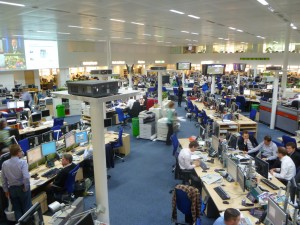 On a sunny morning at Buckingham Palace Road’s Telegraph offices; Mr. Brogan received two Franco-British students in the heart of the journalistic hub. After taking time to walk us around the redesigned former stock exchange open space; he kindly answers our questions…
On a sunny morning at Buckingham Palace Road’s Telegraph offices; Mr. Brogan received two Franco-British students in the heart of the journalistic hub. After taking time to walk us around the redesigned former stock exchange open space; he kindly answers our questions…
Can you say a few words about your education and your career?
Most of my education took place in the French school system. I grew up in Washington DC and went to the French Lycée Rochambeau in Washington where I did my Baccalaureat. I was a terrible student, I did section B economy and scraped through “Bac sans mention” because I was too busy having a good time. I went from there to university of Massachusetts in a town called Amherst where I studied history. After that I came here to England to do a Master Degree in International Relations at Cambridge. That’s my education…. Though I didn’t end up particularly educated!
A few months after my Masters I was lucky enough to be offered a job at the Glasgow Herald as a reporter in Glasgow in the Newsroom. I worked quite a few years, had a very good time there, did all kinds of things for them, and ended up as a Political Correspondent at the House of Commons. From there I held a number of jobs as political correspondents. I worked for the Daily Mail, I worked for the Telegraph as political correspondent, then went back to the Daily Mail as Political Editor and after a few years of that I was asked to join the Telegraph as Assistant Editor and Chief Political Columnist in 2009. I was made Deputy Editor of the Newspaper a few months later and was there ever since.
How has your life acquired a Franco-British dimension and what are the assets of a Franco British upbringing?
I am helped enormously by the fact that my mother is French and my father is English so I have a genetic Franco British dimension; that is quite a natural advantage. Like many people in my situation, at some point I had to choose which side of the Atlantic to end up in; many of my friends and family stayed in America. I ended up in London. So I spent most my holidays in France and my family and their connections makes that the Franco British dimension figures quite prominently in the private side of my life. Although it doesn’t figure as much in my work life, as I am a British journalist covering British politics here in London.
It is an asset to speak a foreign language in any walk of life. The Telegraph is very invested in the Entente Cordiale, and always has had a keen interest in French readers. Our readers tend to be Francophile by disposition, they do business in France and spend their holiday in France. France figures prominently in what the Telegraph does as a Newspaper. We have a full time correspondent in Paris. We spent a lot of time reporting French politics, French culture.
As a British journalist how do you see France?
France is a country that I love dearly and that am consistently interested in because it is very much like Britain. It is a “Grande Puissance Européenne”; which has a vocation as one of the continent’s leading nation and has an extraordinary history that is profoundly intertwined with the history of the United Kingdom. It is a country that is at the heart of every aspect of the European debate which Britain has always taken a great interest in. And so “C’est un pays incontournable” for us here in London. And that is why I think France is a country Britain is always engaged with; at times the relationship is great, at times it’s difficult, but it’s a relationship which is based on long standing ties of affection and common interest based around a common history of shared experiences in success and adversity. Put aside my personal interest in it, I think you don’t have to be French or Francophone in Britain to understand that France is our most prominent neighbor, and a country that cannot be ignored or avoided. Therefore it plays a prominent part in our identity as a nation.
What are the differences between British journalism and French journalism according to you?

I think there are all kinds of great differences.
First we should just identify the common traits: France has a great tradition of a muscular free press, journalists in France and Britain have a common interest in their rights to freedom of expression and the role they play in a successful civic society and a successful democracy.
That said there are great differences. I can’t help but observe that journalism and particularly newspaper journalism is facing a challenging environment around the world (but particularly in Europe). While I think that in Britain we still have a vibrant newspaper culture and still a strong newspaper reading country, although we are reading fewer newspapers now than we were 10-20 years ago; if you look at France the situation of the newspaper in France is very worrying, and there are a number of reasons for that.
I think one is that the economic model and the restrictions on newspaper distribution in France mean that it is economically almost unviable, but not quite. I think there is a separate issue around the relationship between the State and the Press in France. And I think they operate at two levels; I think one is just the sort of formal relationship, whether it is issues around different forms of State control on media prices, on the price of newsprint, on the relationships with the trade unions to I would argue the more dangerous and insidious informal relationships which are to do with the, to my eyes as an outsider, unhealthy relationship of intimacy between French journalists and French politicians.
I think separately there is also a question about the ownership structure in France. In Britain there is a great tradition of newspaper owners being quite happy of seeing their newspapers attack the established order and give governments a hard time; I don’t get the impression that the same tradition applies in France where the relationships between newspaper owners and governments play a different role in the success of newspapers. The thing I would take away as the most important observation I could make, and which for a British journalist is perhaps puzzling, is that French journalists, I don’t think, do what we do here, which is wake up every morning and ask ourselves “how are we going to sell more newspapers”. Too much of French newspapers appear to be about a conversation between intellectuals and not a preoccupation about “what am I going to do to make this newspaper compelling to the station manager in Limoges, or the garage owner in Nimes or the housewife in Chateau de Chatelaillon plage. I get the impression that for too many French journalists, journalism is a cerebral activity rather than a commercial activity. When we get up every morning, we need to think about what are we going to do here at the Telegraph to make sure it sells, because if it does not sell, we don’t make money, and if we don’t make money, we lose money, if we lose money we can’t stay in Business. We are not a charity and we are not a kind of intellectual newsletter we are a commercial proposition and I think there is a lack of commercial drive in the French press.
And the only other thing is that I do not see enough French newspapers holding elected politicians to account. At the Telegraph we shook things up by publishing the expenses of MPs, I’d love to see Le Monde or Le Figaro do a big “exposé” of the expenses of French parliamentarians or the Elysee.
Could you compare the French political culture and the English political culture?
You have to be cautious when you compare two countries because they have different traditions and one model is not transposable to another place. I think our politics are perhaps more confrontational, I think our politics are noisier, and I think what we have in Britain is a greater tradition of voters through a very vigorous newspaper culture holding the power to account. For example, in Britain we are very concerned that for various reasons we ended up financially in a mess. We are in debt up to our neck, we owe a lot of money and the government is spending way too much money and is running a terrible deficit which it is trying to close. So they are saving money in all sorts of ways. And one of the ways it is saving money is that Ministers no longer have cars and Ministers are now expected to take the tube – and ministers hate that. And the press has been driving that, rightly asking the question “Why is it that taxpayers should pay for Ministers to have chauffeurs?”. I just can’t imagine that kind of debate taking place in France where Ministers have plenty of cars, and apartments and all kinds of perks that in this country would be utterly intolerable, and it would be intolerable because the press would draw attention to them and voters would get angry about it. Now I don’t know if that is because the press in France have drawn attention to it and French voters are relaxed about seeing their money used to pay for chauffeurs or because French journalists have not drawn attention to it; but there is a much more puritanical political culture here around issues to do with money, corruption and French would say we are too obsessed with sex.
Interviewed on 28 March 2012 in the Telegraph offices, London
Franco-British Portrait Gallery
© Florian Bercault & Capucine Riom

